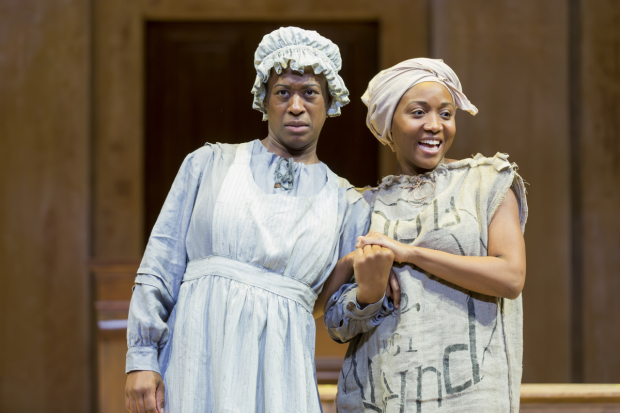An Octoroon

(© Scott Suchman/Woolly Mammoth)
An Octoroon, written by Branden Jacobs-Jenkins, was first produced at Woolly Mammoth Theatre Company in 2016 and is now being remounted there. Created in response to Dion Boucicault's 1859 The Octoroon, a famous antebellum melodrama, the piece addresses the use of actors of one race playing characters of another race, theatrical conventions, and the issue of slavery.
Before Jacobs-Jenkins reframes Boucicault's play, using some of its original characters and plot, a character named BJJ (Jon Hudson Odom) appears, introducing himself as a black playwright, answering questions from an unseen therapist about his craft that address how theater intersects with his own identity. As BJJ opens up, he explains that Boucicault used all white performers, but now that the issue of race is so sensitive, he therefore must play the role of a white man himself.
Odom proceeds to apply whiteface and don a blond wig to play George, an altruistic young man who falls in love with a young girl named Zoe (Kathryn Tkel), who has been living with her aunt and uncle on a Louisiana plantation that is now in financial straits. Zoe is an octoroon — a person who is one-eighth African-American. Odom also plays George's archrival, M'Closky, who wants to purchase Zoe when the plantation comes up for auction.
Soon the character of Boucicault (James Konicek) arrives onstage, upset that he is no longer famous. Though Caucasian, he applies red face paint to play the role of the Native American, Wahnotee. His assistant (Joseph Castillo-Midyett) puts on blackface so that he can play the roles of plantation slaves Pete and Paul.
After this prelude, the action switches to the decrepit plantation, where house slave Dido (Erika Rose) sweeps cotton from the grounds while another house slave, the very pregnant Grace (Felicia Curry), hauls a basket full of apples. The lackadaisical Minnie (Shannon Dorsey) observes. Through their banter, Dido and Minnie reveal information about the plantation community. In addition to Zoe, there is a simpering young Southern belle named Dora (Maggie Wilder), who sees George as a potential husband.
Odom is brilliant in all three roles, but particularly in Act 2, when he plays George and M'Closky battling each other for the right to love Zoe. Fight choreographer Robb Hunter does a fabulous job of making a knife fight between George and M'Closky look realistic. Konicek is smooth and convincing as Boucicault, Wahnotee, and an auctioneer. Tkel is charming as Zoe, who knows she can't marry George, but is too noble to complain. Wilder is funny as the manipulative Dora. Rose, Dorsey, and Curry are a delightful mash-up of attitudes: Dido is a bit old-fashioned while Minnie could be found anywhere in America today. Castillo-Midyett neatly differentiates between the older Pete and the young boy, Paul.
Director Nataki Garrett keeps the play moving quickly, emphasizing the play's strong undercurrent of comedy and absurdity. Designer Misha Kachman creates the front of a run-down mansion in the first act. In the second act, the set transitions the action to the courtyard of the plantation house, which becomes the site of a slave auction. The final scene shows slave quarters on the edge of a swamp. Ivania Stack's costumes lean more toward the fantastical. George wears a pale blue satin coat embroidered with pink flowers while Dora's oversize hoop skirts barely fit through the door of the plantation house. Cocomposers Christylez Bacon and Wytold have created a varied score. Cellist Katie Chambers moves between plucking her instrument's strings and playing lyrical or moody accompaniment to the action.
Jacobs-Jenkins fools with assumptions about theater from beginning to end in An Octoroon. His message is — just as Boucicault's was — that slavery is hateful and unjust. But Jacobs-Jenkins's play goes a step further in questioning why racial injustice has not faded away since 1859. He does not simply tell a story about racial tension, but illustrates what a pitifully short distance we have traveled in trying to relieve that tension.











